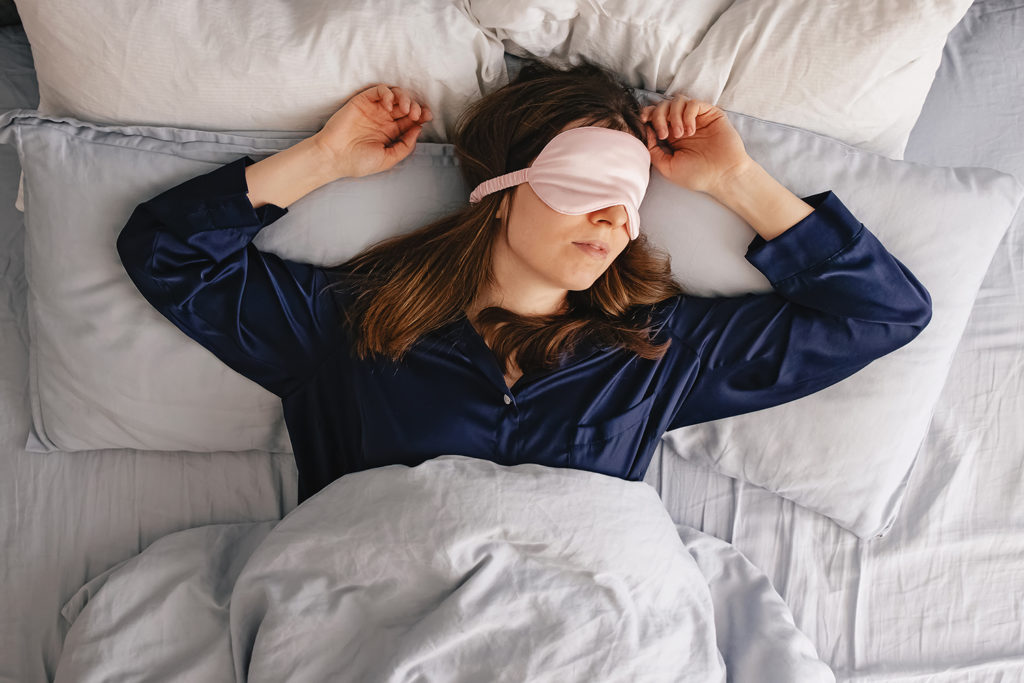Sleep loss can be helped through what doctors and sleep specialists refer to as proper sleep hygiene. These are best practices which have been shown to help people get sufficient sleep. I’ve introduced a number of these habits in my own life and found them quite helpful.
Tips for proper sleep hygiene include:
- Exercise regularly;
- Choose calming activities to wind down in the evening;
- Soak your feet — it can have similar results to taking a bath or shower;
- Try a medical supplement such as melatonin;
- Consider your lifestyle and other health concerns and combat stressors with meditation, deep breathing or anything else you find relaxing;
- Address other health concerns and the possibility you may have sleep apnea and, if so, schedule an appointment with your doctor for further testing and discussion; and
- Keep a sleep journal on your bedside table, record your sleep patterns and share with your doctor, if needed.
How Food Affects Our Sleep
What we eat — and when we eat it — may also keep us awake at night. One of the most common reasons for this is digestion. Avoid eating meals (or even snacks) two hours prior to turning in for the night.
While you don’t want to go to bed hungry (a grumbling stomach will keep you awake), you don’t want to go to bed with a full stomach either. Heavier foods take longer to digest while excessive liquids (alcohol or otherwise) will result in more bathroom trips overnight.
Improve Your Environment to Improve Your Sleep
There are many ways to improve your sleep. Create a restful sleeping environment by doing the following:
- Keep the room dark by turning off the lights and closing the bedroom door;
- Hang heavier blinds/curtains to block outside light;
- Turn down the furnace — a cooler room temperature may help you sleep;
- Replace a digital alarm clock to one with a softer and more calming display light;
- Reduce distractions while you’re in bed — reading can help relax you while playing an electronic game may engage your brain and keep you awake;
- Ensure your mattress is comfortable — mattresses should be replaced every seven to eight years;
- Evaluate your pillow as well ensuring it still provides proper head and neck support; and
- Wear an eye mask or ear plugs — either or both of these ideas can help to block out distracting light or noise.
Why Sleep is Good for Your Brain Health
Insomnia continues to be a well-researched subject with some interesting findings, such as poor sleep’s link to Alzheimer’s. An article from Psychology Today explained, “When it comes to mental well-being, sleep matters tremendously. During sleep, the body and brain repair themselves, strengthening the immune system —which has close ties to mental health — bolstering the stress response, and recharging the systems regulating emotions, and assisting to consolidate memories and thoughts, focus, and connections to others. High-quality sleep, in short, can improve someone’s life in a number of ways.”
Another article from the Brain & Health Magazine reports that proper sleep has direct impacts on our human brains and found, “Experts agree quality sleep is critical to cognitive function, especially in the short term. Studies show sleep deprivation hinders learning, impairs cognitive performance, and slows reaction time — like being intoxicated but without the buzz. Scientists recently discovered that sleep and memory storage are inextricably linked as well. Now, they are wondering whether poor sleep contributes to neurodegenerative diseases and cognitive decline.”
What both these articles (and others like them) are saying is that a brain that is not working becomes a brain that will not continue working and will, in due course, shut down.
While getting to sleep and staying asleep may seem hard to do, the answer may not be that difficult. With some easy adjustments, you can, once again, be resting well and getting the sleep that you need. Sweet dreams!
Amanda Butas is a Geriatric Case Manager at Home Care Assistance. The Mesa office is located right next to Bed Bath and Beyond on the northeast corner of Power and McKellips roads. Home Care Assistance provides home care services on an hourly or around-the-clock basis to older adults who need help.
Services include support with basic activities of daily living and those living with certain conditions, such as Alzheimer’s or Parkinson’s, as well as supporting a successful transition home from the hospital or a rehab facility. For more information, call (480) 699-4899.


